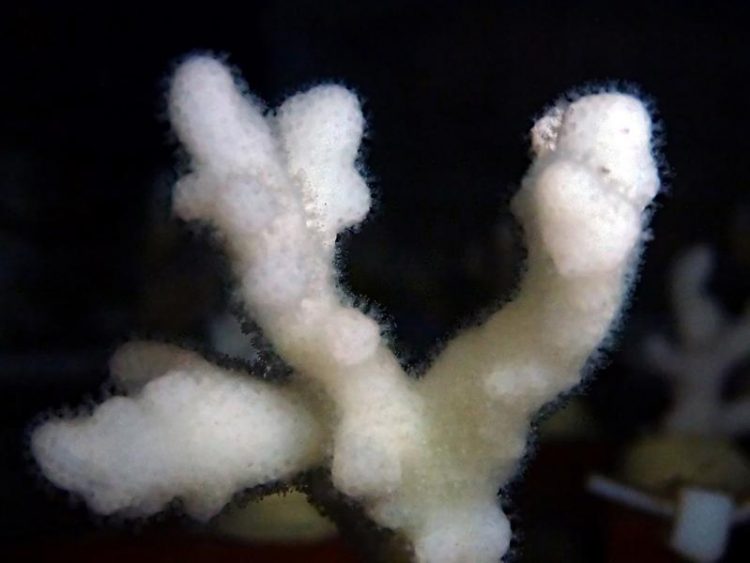Bacteria may help some corals survive bleaching events

One of the corals that bleached during the experiment, with the coral polyps expanded. Dr. Ulisse Cardini
This is the key finding of a new study carried out by an international research team under the supervision of Prof. Dr. Christian Wild (Marine Ecology, University of Bremen, Germany).
The study was recently published in the prestigious international journal “Environmental Microbiology”. Dr. Ulisse Cardini, who graduated last year at the University of Bremen and now works as researcher at the University of Vienna (Austria), is the first author of the study.
Coral bleaching and its linkage to ocean warming
Warm water corals are animals that grow optimally in water temperatures between ca. 23° and 30 °C. If temperatures exceed this comfort zone, then often coral bleaching occurs. In this process, corals loose most of their color as millions of microalgae that live within the corals leave their animal host.
As bleaching occurs, corals are not dead, but in a state of great weakness since they lack the algae that normally provide them with essential energy and nutrients. That is why bleaching often leads to mass mortality of corals, particularly if the heat stress is long-lasting and pronounced. Conversely, corals can re-uptake the microalgae and recover from bleaching when temperatures drop back to normal.
In recent years, ocean warming in combination with El-Nino phenomena led to a high frequency of extended coral bleaching events with ensuing mass mortality (e.g. 1998 in the Indian Ocean, 2002 in the Pacific Ocean, and 2005 in the Caribbean). At the moment, we are witnessing the worst mass coral bleaching on record affecting all world oceans.
The important role of bacteria in bleached corals
The study by Ulisse Cardini, Christian Wild, and others provided evidence supporting the hypothesis that a group of bacteria capable of nitrogen fixation may help their host corals to better survive through heat stress events. In fact, these microbes are able to provide essential nutrients that may be deficient in the coral when their symbiosis with microalgae is heat impaired.
During field and laboratory experiments at the Northern Red Sea (Aqaba, Jordan) the research team could demonstrate that nitrogen fixation increased by up to 300% in some of the corals exposed to heat stress. However, the outcome of the temperature stress was different in different corals.
In this context, the highly under-investigated interplay between the coral animals, the symbiotic algae, and the associated bacteria plays an important role and may select winners and losers in the world's coral reefs of the future.
Publication:
Cardini et al. (2016) Microbial dinitrogen fixation in coral holobionts exposed to thermal stress and bleaching (in press at Environmental Microbiology).
Further information:
Prof. Dr. Christian Wild
University of Bremen
Faculty Biology / Chemistry
Marine Ecology
Phone. 0421 218 63367
E-mail: christian.wild@uni-bremen.de
Dr. Ulisse Cardini
University of Vienna
Department of Microbiology and Ecosystem Science
Division of Microbial Ecology
www.ulissecardini.info
Phone: +43 677 61633148
E-mail: cardini@microbial-ecology.net
Media Contact
More Information:
http://www.uni-bremen.deAll latest news from the category: Life Sciences and Chemistry
Articles and reports from the Life Sciences and chemistry area deal with applied and basic research into modern biology, chemistry and human medicine.
Valuable information can be found on a range of life sciences fields including bacteriology, biochemistry, bionics, bioinformatics, biophysics, biotechnology, genetics, geobotany, human biology, marine biology, microbiology, molecular biology, cellular biology, zoology, bioinorganic chemistry, microchemistry and environmental chemistry.
Newest articles

A ‘language’ for ML models to predict nanopore properties
A large number of 2D materials like graphene can have nanopores – small holes formed by missing atoms through which foreign substances can pass. The properties of these nanopores dictate many…

Clinically validated, wearable ultrasound patch
… for continuous blood pressure monitoring. A team of researchers at the University of California San Diego has developed a new and improved wearable ultrasound patch for continuous and noninvasive…

A new puzzle piece for string theory research
Dr. Ksenia Fedosova from the Cluster of Excellence Mathematics Münster, along with an international research team, has proven a conjecture in string theory that physicists had proposed regarding certain equations….



